备考2011高效学习方案英语高三册:units 5~6 greeting the message & going west
文档属性
| 名称 | 备考2011高效学习方案英语高三册:units 5~6 greeting the message & going west |
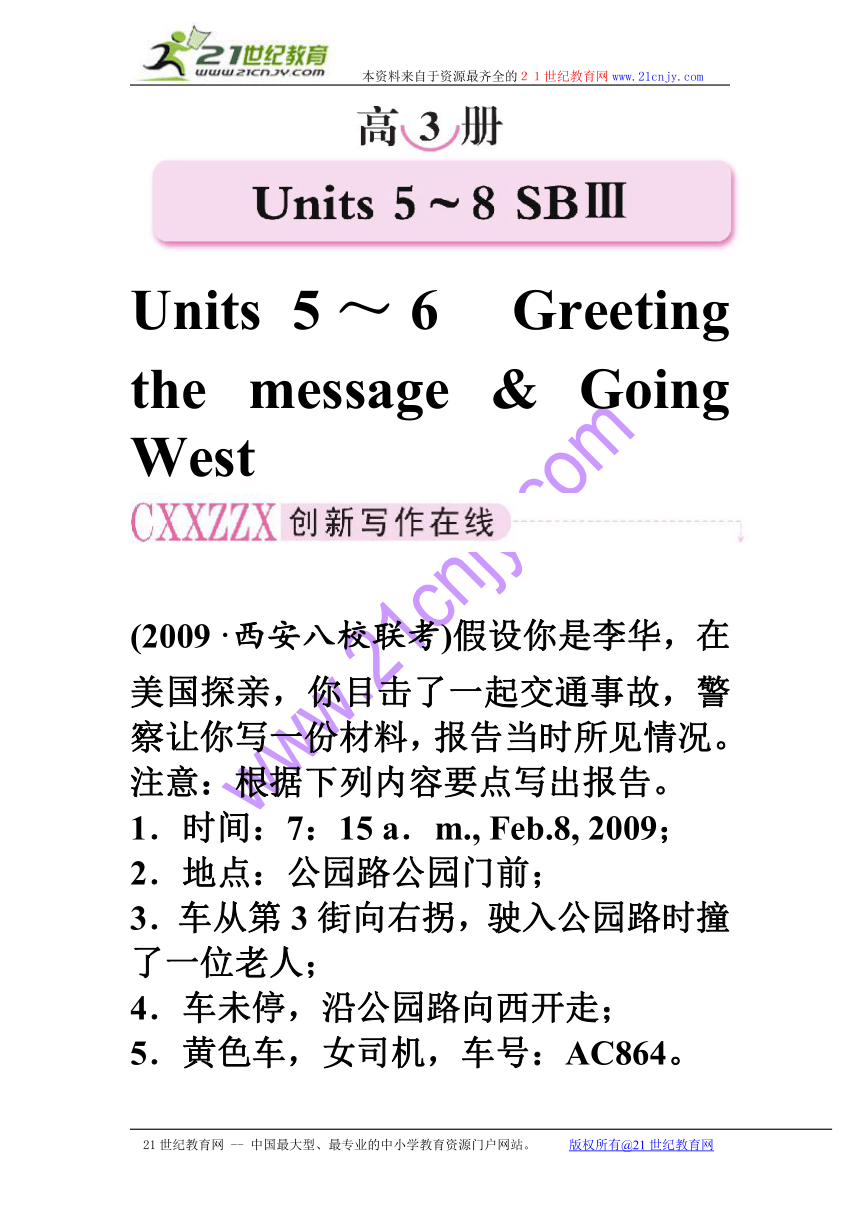
|
|
| 格式 | rar | ||
| 文件大小 | 418.6KB | ||
| 资源类型 | 教案 | ||
| 版本资源 | 人教版 | ||
| 科目 | 英语 | ||
| 更新时间 | 2013-11-24 00:00:00 | ||
图片预览

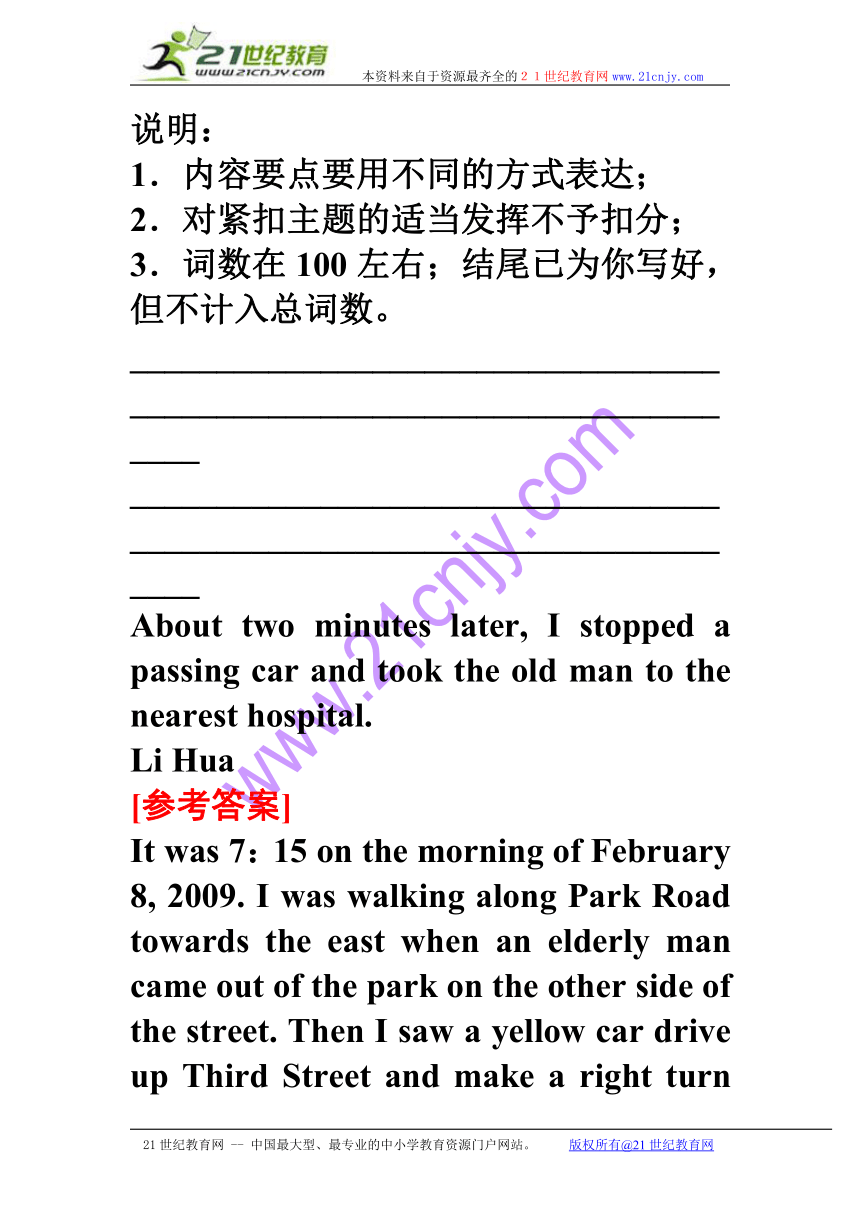
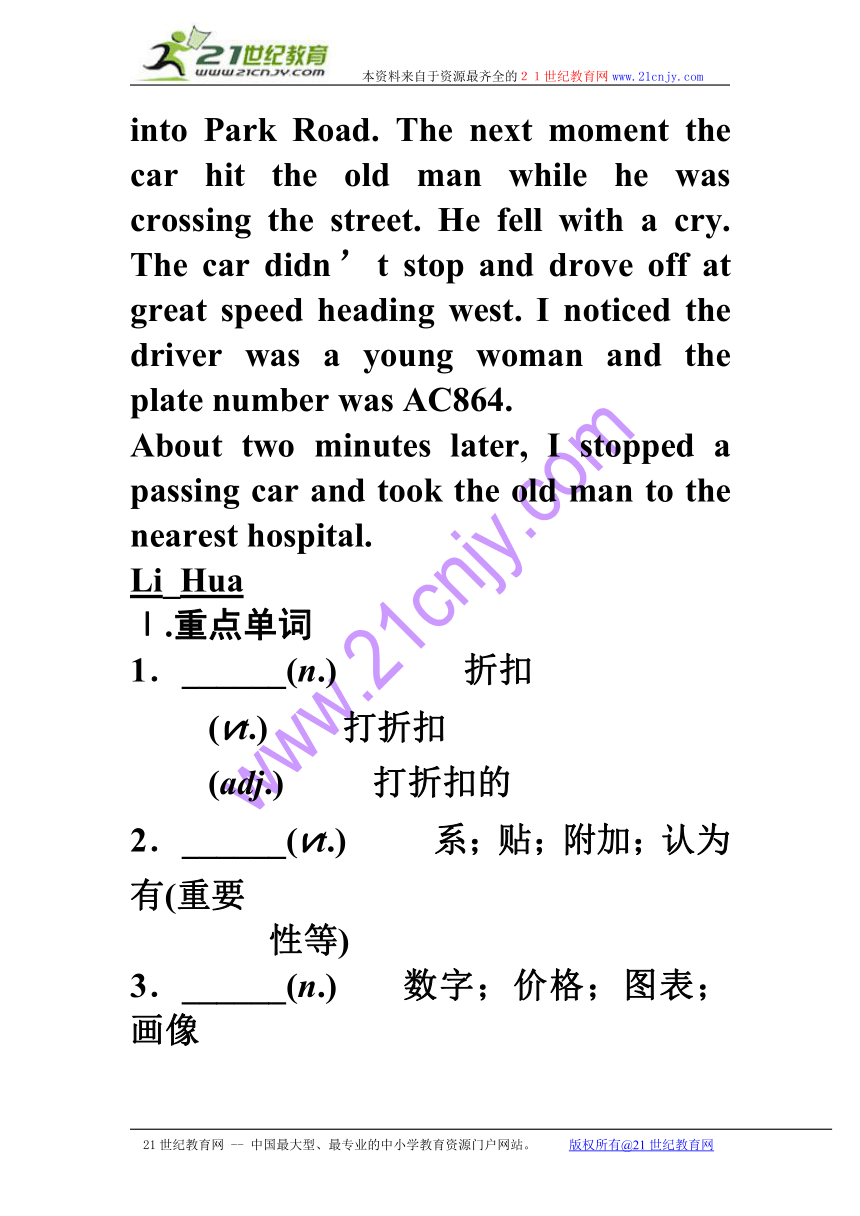
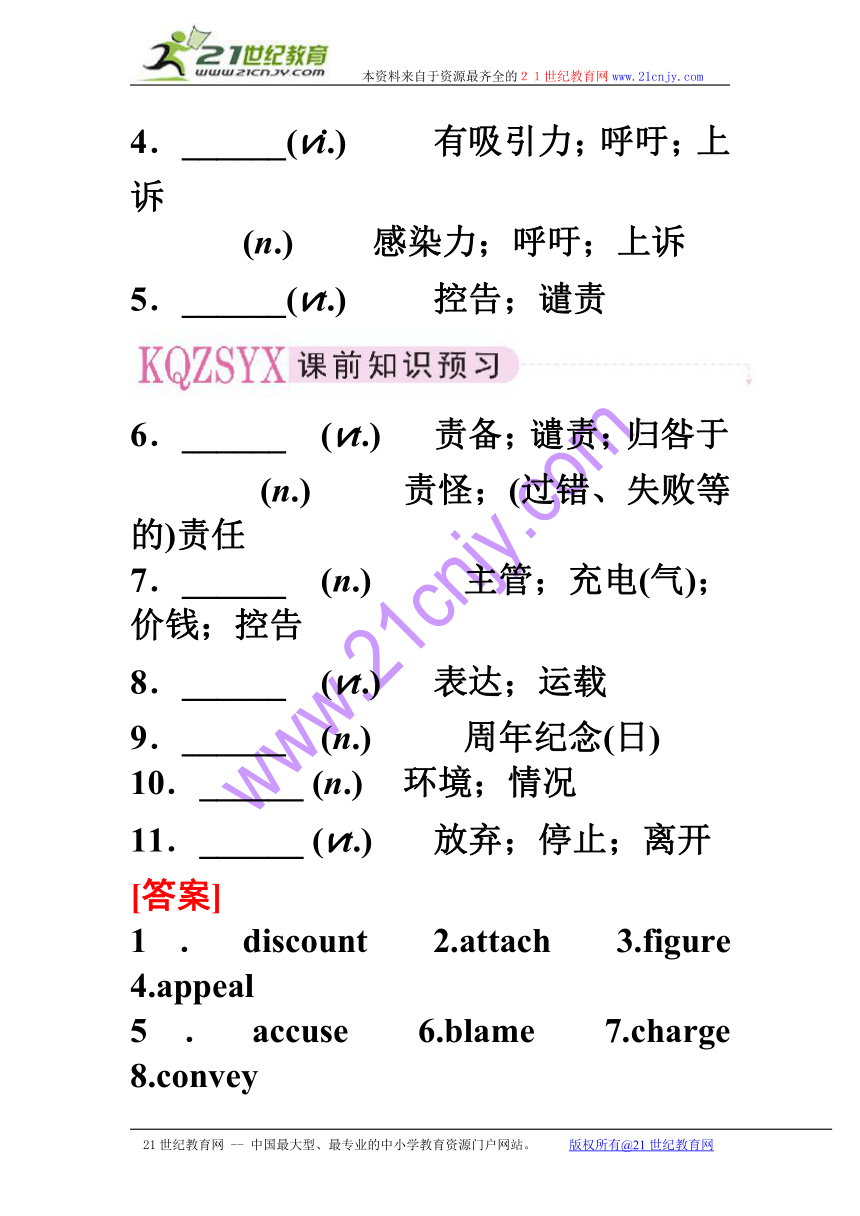
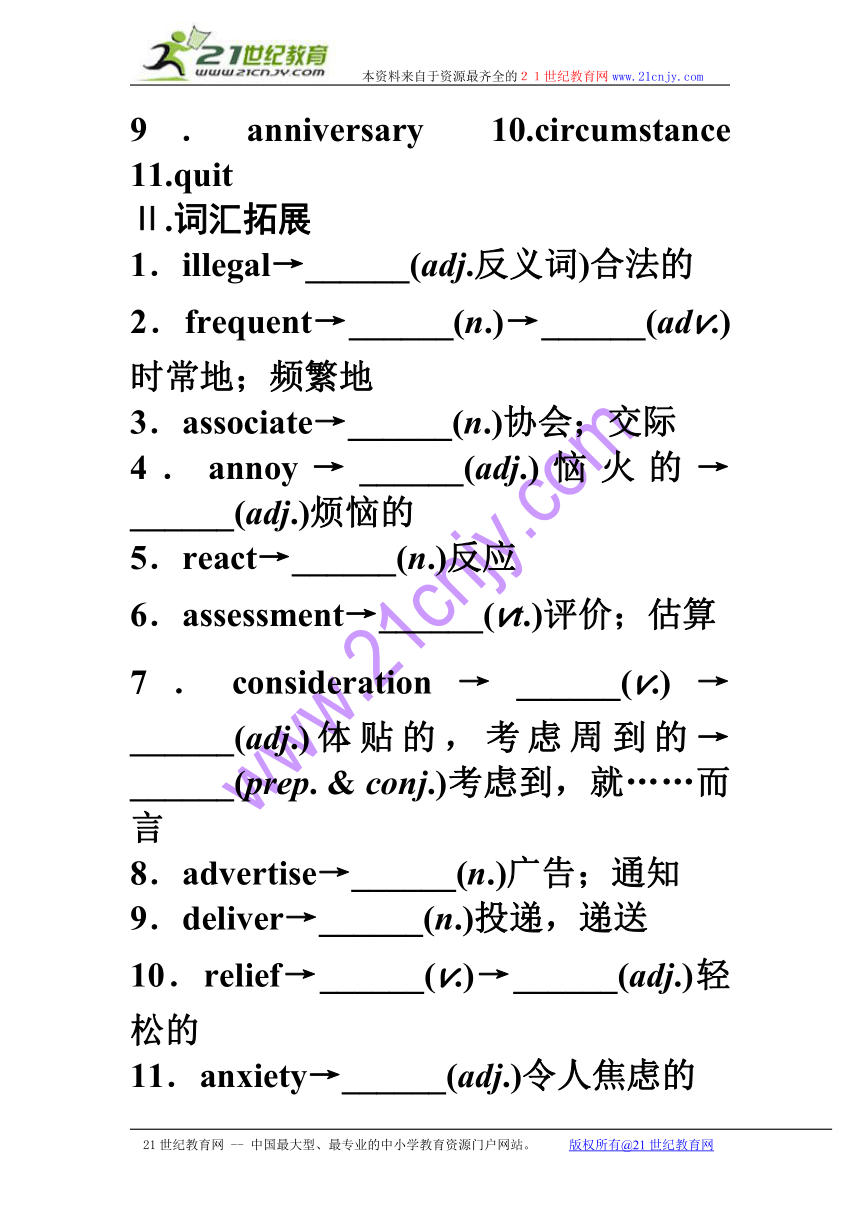
文档简介
本资料来自于资源最齐全的21世纪教育网www.21cnjy.com
Units 5~6 Greeting the message & Going West
(2009·西安八校联考)假设你是李华,在美国探亲,你目击了一起交通事故,警察让你写一份材料,报告当时所见情况。
注意:根据下列内容要点写出报告。
1.时间:7:15 a.m., Feb.8, 2009;
2.地点:公园路公园门前;
3.车从第3街向右拐,驶入公园路时撞了一位老人;
4.车未停,沿公园路向西开走;
5.黄色车,女司机,车号:AC864。
说明:
1.内容要点要用不同的方式表达;
2.对紧扣主题的适当发挥不予扣分;
3.词数在100左右;结尾已为你写好,但不计入总词数。
________________________________________________________________________
________________________________________________________________________
About two minutes later, I stopped a passing car and took the old man to the nearest hospital.
Li Hua
[参考答案]
It was 7:15 on the morning of February 8, 2009. I was walking along Park Road towards the east when an elderly man came out of the park on the other side of the street. Then I saw a yellow car drive up Third Street and make a right turn into Park Road. The next moment the car hit the old man while he was crossing the street. He fell with a cry. The car didn’t stop and drove off at great speed heading west. I noticed the driver was a young woman and the plate number was AC864.
About two minutes later, I stopped a passing car and took the old man to the nearest hospital.
Li_Hua
Ⅰ.重点单词
1.______(n.) 折扣
(vt.) 打折扣
(adj.) 打折扣的
2.______(vt.) 系;贴;附加;认为有(重要
性等)
3.______(n.) 数字;价格;图表;画像
4.______(vi.) 有吸引力;呼吁;上诉
(n.) 感染力;呼吁;上诉
5.______(vt.) 控告;谴责
6.______ (vt.) 责备;谴责;归咎于
(n.) 责怪;(过错、失败等的)责任
7.______ (n.) 主管;充电(气);价钱;控告
8.______ (vt.) 表达;运载
9.______ (n.) 周年纪念(日)
10.______ (n.) 环境;情况
11.______ (vt.) 放弃;停止;离开
[答案]
1.discount 2.attach 3.figure 4.appeal
5.accuse 6.blame 7.charge 8.convey
9.anniversary 10.circumstance 11.quit
Ⅱ.词汇拓展
1.illegal→______(adj.反义词)合法的
2.frequent→______(n.)→______(adv.)时常地;频繁地
3.associate→______(n.)协会;交际
4.annoy→______(adj.)恼火的→______(adj.)烦恼的
5.react→______(n.)反应
6.assessment→______(vt.)评价;估算
7.consideration→______(v.)→______(adj.)体贴的,考虑周到的→______(prep. & conj.)考虑到,就……而言
8.advertise→______(n.)广告;通知
9.deliver→______(n.)投递,递送
10.relief→______(v.)→______(adj.)轻松的
11.anxiety→______(adj.)令人焦虑的
12.accustomed→______(v.)使习惯于
13.burden→______(adj.)沉重的,难于负担的
14.survival→______(v.)→______(n.)幸存者
[答案]
1.legal 2.frequency; frequently 3.association
4.annoying; annoyed 5.reaction 6.assess
7.consider; considerate; considering 8.advertisement
9.delivery 10.relieve; relievable 11.anxious
12.accustom 13.burdensome 14.survive; survivor
Ⅲ.重点短语
1.look ______ for 小心,注意
2.accuse...______... 控告……
3.make ______ 有意义;有道理;讲得通
4.point ______ 指出;使注意
5.appeal ______ 有吸引力;呼吁;上诉
6.get ______ 传播;为人所理解
7.______ most cases 在多数情况下
8.in anxiety ______ 渴望
9.______ need of 需要
10.adapt ______ 适应
11.go ______ 为……去;努力获取
12.tie ______ 系;拴;捆
13.come to ______ end 结束;终止
14.leave ______ 忘带;留下
15.keep ______ 维持;保持
16.take ______ easy 别紧张;放松点
17.______ heart 泄气;灰心
18.apply...______... 运用;应用于
[答案]
1.out 2.of 3.sense 4.out 5.to 6.across
7.in 8.of 9.in 10.to 11.for 12.up 13.an
14.behind 15.up 16.it 17.lose 18.to
Ⅳ.重点句型
1.Armed with facts and figures, customers are better able to deal with the often powerful arguments given by a salesman or saleswoman.
掌握了一些事实和数据之后,顾客就能更好应付销售人员强有力的劝说。
2.Today’s advertisements often start with a question, or a puzzle, with the purpose of attracting the readers’ attention.
今天的广告经常一开头就提出一个问题,或者一个谜团,目的是为了吸引读者的注意力。
3.Now we were on our feet with another 500 miles to go.
现在我们要靠我们的双脚走另外500英里路。
4.If untreated, it would produce a powerful poison that would kill the patient.如果不治疗,它会产生一种强烈的毒素,使病人死亡。
Ⅴ.重点语法
1.Review the Object Complement(复习宾语补足语)
2.Review the Attribute(复习定语)
1.bargain n.①特价商品,便宜的东西②(买卖等双方的)协议,交易 vt.讨价还价
搭配:bargain with sb. about/over/for sth.与某人讨价还价,洽谈某物的价钱;a good/bad bargain一笔划算/不划算的交易;a bargain price廉价;pick up wonderful bargains挑到一些价廉物美的东西。
If you bargain with them they might reduce the price.
如果你讲讲价,他们可能会把价钱降低。
This shirt is a real bargain at such a low price.
这件衬衫这么便宜,真划得来。
[指点迷津]
通过“bargain with sb.”,卖主可能“give/offer(a)10% discount给10%的折扣”。
In the market, the merchants ______ and joked with their friends and neighbours.
A. disputed B. debated
C. quarreled D. bargained
解析:句意:在市场上,那些商人和他们的朋友和邻居们一边讨价还价,一边开玩笑。bargain“讨价还价”;dispute“争论,争端”;debate“争论,辩论”;quarrel“争吵”。在市场上谈论价钱是最合情合理的,其他三个词都不合实际。
答案:D
2.attach vt.①系,贴,连接②使依恋,使喜爱③认为有(重要性、责任等)④使附属
搭配:attach to使属于,使参加;认为有(责任等),(罪责等)在……身上;attach importance to重视;be attached to(变得)喜欢,依恋,对……有感情。
I got lost so I attached myself to another party of tourists.
我迷了路,所以只好加入另一个旅行团。
[指点迷津]
attach与attack(攻击)很相似,请不要将二者混淆。
She ______ a chain to the dog’s collar.
A. granted B. kept
C. attached D. beard
解析:attach在此表示把……连在……上面(可译为“拴”);grant表示“同意,准予,给予,授予”;keep“保留,保存”;beard“胡子”,是名词。
答案:C
3.appeal vi./n.呼吁;申诉;(有)吸引力;诉诸,求助 vt.将……上诉appeal to有吸引力;呼吁;上诉
Her sense of humour appealed to him enormously.
她的幽默感强烈地吸引住了他。
She appealed to the high court against her sentence.
她不服判决而向高等法院上诉。
The government is appealing to the public for help for those who lost their homes in the flood./An appeal is being made by the government for help for those who lost their homes in the flood.
政府正在呼吁公众对在水灾中丧失家园的人给予援助。
As a result of the radio ______ for help for the earthquake victims, over a million pounds has been raised.
A. beg B. plead
C. appeal D. call
解析:句意:由于广播呼吁援助地震受害者,已经募集到一百多万英镑。appeal for“呼吁”,强烈要求帮助,支持等;beg“乞讨,恳求”;plead向人求情或替某人求情以求宽恕或同意,请求等;call for指一般的要求。
答案:C
4.associate vt.①(在思想上)把……联系在一起②使联合,结合,使有联系 vi. (with)结交,交往 n.伙伴,同事,合伙人 adj.副的
搭配:associate...with...(在头脑中)把……与……联系在一起;be associated with...(在思想上认为)与……有联系,与……有关;associate with sb.与某人交往、打交道。
We often associate roses with love.
我们经常由玫瑰联想到爱情。
I prefer to associate with people from all walks of life.
我喜欢与各行各业的人交往。
[指点迷津]
associate总是与介词with搭配使用。
A healthy life is frequently thought to be ______ with the open countryside and homegrown food.
A. tied B. bound
C. involved D. associated
解析:句意:人们常把健康的生活同广阔的乡村和自产的食物联系在一起。
答案:D
5.accuse vt.指控,控告,指责
搭配:accuse sb. of...指控某人犯……错/罪;be accused of...被指控犯了……错/罪
The police accused him of murder, but he said that he was innocent.
警方指控他犯了谋杀罪,但他说自己是无辜的。
The police were accused of brutality.
警方被指控行为野蛮。
[指点迷津]
accuse/charge/punish/scold易混淆,注意加以辨析。
The soldier was ______ of running away when the enemy attacked.
A. scolded B. charged
C. accused D. punished
解析:句意:这个士兵被指控在敌人进攻时,临阵脱逃。accuse普通用词,可用于表达正式或非正式、公事或私事的文字中,指直接或尖刻地归罪于某人或指责某人做错某事,与of搭配,即accuse sb. of...; charge正式用词。指依法控告,强调犯罪的严重情和指控的正式性,与with搭配,即charge sb. with...; punish意为“惩罚,处罚”,常与介词for搭配,即punish sb. for...“因……惩罚某人”;scold意为“责骂,斥责”,常与介词for或at搭配,即scold sb. for/at...“因……责骂某人”。
答案:C
6.annoy vt.使恼怒,使生气;打扰,干扰 vi.招人讨厌;惹人烦恼
annoying adj.讨厌的;恼人的(相当于boring)
搭配:annoy sb. by doing sth.因为某事使某人生气;be annoyed at sth.对……很生气;be annoyed with被……惹恼;be annoyed to do sth.做……感到生气
[指点迷津]
注意辨析bother/interrupt/interfere/annoy。
I am ______ that he has not answered my letter.
A. bothered B. interrupted
C. interfered D. annoyed
解析:句意:他没有给我回信,使我很生气。annoy“使恼怒,使生气”;bother不停打扰使人不安宁,着重于动作;interrupt指打断某事或某人,通常指以说话的方式来打扰人;interfere“干涉,妨碍(某人或某事)”。
答案:D
7.react vi.反应;反其道而行;起化学反应;影响,起作用
搭配:react against反动,起反作用;react to对……作出反应,对……有效;react on/upon对……产生影响,反过来影响
How did he react to the news
他对这消息有何反应?
Will the people ever react against this dictator
有朝一日人民会起来反抗这位独裁者吗?
As you have seen, the value of a nation’s currency is a ______ of its economy.
A. response B. revelation
C. reaction D. reflection
解析:句意:正如你所看到的那样,一个国家货币的价值反映了这个国家的经济情况。reflection“反映,表达”;response“回答,答复,反应,响应”;revelation“揭露,揭露的事物,新发现”;reaction“反应,反动,反作用”。
答案:D
8.blame vt.责备;谴责;归咎于 n.责怪;(过错、失败等等)责任
blame sb. for (doing) sth.因(做)某事而指责某人
blame sth. on sb.因某事而指责某人
sb. be to blame for (doing) sth.因(做)某事某人应该受到谴责/应负责
scold sb. for (doing) sth.因(做)某事而责备某人
The student blamed the teacher for his failure.
学生因失败而怪老师。
[指点迷津]
考生易将blame与scold混淆,请加以区分:
scold vt.“责骂”,“训斥”,指大声呵斥,责备,唠唠叨叨地说,常用于长辈对晚辈,上级对下级。blame n. & vt.意思是“责备”,“责怪”,语气较轻。
The mother didn’t know ______ to blame for the broken glass as it happened while she was out.
A. who B. when
C. how D. what
解析:本题考查“疑问词+不定式”的用法。此题的解题关键在blame一词上,常说blame sb. for doing sth.,即本题中blame后缺宾语,此处用who代whom,作blame的逻辑宾语。句意为:那位母亲不知道责骂谁好,因为杯子是在她出去的时候被打破的。
答案:A
9.charge vt.要求收费,要价 n.主管;充电(气);价钱;控告
搭配:charge sb. money for sth.
charge money for sth.
charge sb. for sth.向某人索取……的费用
sb. be in charge of sth.某人负责管理(某一事项);
sth. be in the charge of sb.(某一事项)由……负责
How much do you charge for mending a pair of shoes
修一双鞋要多少钱?
What’s the charge for a room
一间房子要付多少钱?
[指点迷津]
change [U]“零钱,找头”。请不要与charge混淆。
in charge of是介词短语,它常作状语;它只有与be连用时才能作谓语。
A local clothing store offered me credit(赊账)although I was only in seventh grade. I immediately ______ a $68 sports coat and a $22 pair of shoes.
A. sold B. borrowed
C. charged D. wore
解析:从上文可以看出,当地一家服装店允许作者赊账,作者马上赊了一件价值68美元的运动衣和一双价值22美元的鞋。此处这个动作发生在offered me credit之后立即做的。因此应该是用charged表示“记账”。
答案:C
10.advertise vt.为……做广告,宣传;(在报刊、电视、广播等中)公告(布) vi.登(做)广告,登公告
advertise for为征求……登广告
advertisement n. [C]广告,公告,启事[U]广告活动,宣传
put an advertisement in newspapers在报纸上登广告
He advertised for a used car.
他登广告求购一辆旧车。
to advertise one’s goods为其货品做广告
[指点迷津]
注意区分以下几个词的用法:
advertise指(在报刊、电视、广播等中)公告,(为……)做广告;publish发表(文章);announce宣布,宣告。
The news was announced by Radio Peking.
北京广播电台播报了这消息。
declare指在庄重正式的场合宣布官方或自己的立场,态度。
Bulgaria declared her independence in 1908.
保加利亚于1908年宣布独立。
They ______ their goods for sale extensively and heavily.
A. published B. announced
C. advertised D. declared
解析:句意:他们为推销自己的商品到处大做广告。
答案:C
11.anxiety n.焦虑,忧虑;渴望,热望
anxious adj.焦虑的,令人焦急的,渴望的,急切的
短语:be anxious about/for sb./sth.担心、忧虑某人/某事;be anxious for sth./be anxious(for sb.)to do sth.;渴望得到某物/(某人)急切想做某事;常用搭配:cause sb. great anxiety使某人非常不安;remove sb.’s anxiety消除某人的忧虑;with great anxiety忧心忡忡地,十分焦急地
After the exam, the students waited with anxiety for their marks.
考完试之后,学生们焦急地等待着分数。
We are all anxious about/for her safety.
我们都为她的安全担心。
[指点迷津]
anxiety常与about连用,表示“对……的忧虑”,如:the anxiety about economic situation对经济形势的担忧。与for连用,表示“对……的渴求”,如:the anxiety for knowledge求知的渴望。与to连用,表示“做……的热切希望”,如:the anxiety to please sb.希望讨好某人的急切心情。
To our ______, Geoffrey’s illness proved not to be as serious as we had feared.
A. anxiety B. relief
C. worry D. care
解析:句意:让我们感到宽慰的是,杰夫雷的病经证实不像我们担心的那么严重。从后文语境可知,我们并不担心,故可以排除A、C;care“关心”,与题意不符;relief“宽慰,宽心,减轻”。
答案:B
Ⅱ.短语突破
1.
What he says makes sense.
他说的有道理。
Can you make sense of this poem
你能明白这首诗的含义吗?
What you say is true in a sense.
你所说的在某种意义上是真实的。
[指点迷津]
make no sense=...not make sense
It doesn’t make any sense to me.
我觉得那没什么意思。
This sentence doesn’t make any sense.
这个句子讲不通。
The manager has got a good business ______, so the company is doing well.
A. idea B. sense
C. thought D. thinking
解析:sense这里的意思是(a) power to understand and make judgements about something“辨别力;鉴识力”。如:a sense of direction“方向感”。句意:这位经理有很强的经商意识,因此公司经营良好。
答案:B
Everything had been taken into consideration before the plan was carried out.
该计划实施以前,每件事都被考虑了。
Keep an eye out for everyone who enters the room.
请留意进入房间的每一个人。
Our teacher is clever, but not very good at getting his ideas across (to us).
我们的老师很聪明,但他不善于把自己的观点(向我们)讲清楚。
Dirt and disease go hand in hand.
肮脏与疾病是分不开的。
We must ______ the weather into consideration first when climbing mountains.
A. make B. consider
C. regard D. take
解析:句意:当我们要爬山时首先必须考虑的是天气。take...into consideration“予以考虑……”。
答案:D
It is common sense for a person to miss his/her hometown.
一个人思念家乡是情理之中的事。
I must go back. I’ve left my car keys (behind).
我必须回去,我忘了带汽车钥匙。
It is easy to lose one’s way in forest.
在森林中容易迷路。
The year has come to an end.
一年结束了。
The old man lived through two world wars.
这位老人经历了两次世界大战而幸存下来。
[指点迷津]
①common sense中的sense为不可数名词。
②leave behind忘带;留下;遗失;而forget sth.则表示“忘记某事”。
Luckily, the young girl ______ the terrible earthquake.
A. lived on B. lived by
C. lived through D. lived in
解析:句意:幸运的是,这位年轻的姑娘经历了那场可怕的地震而幸存了下来。live on“以……为主食”;live by“以……方式谋生”;live in“生活在某处”。
答案:C
I hear you are going to go for that job in the accounts department.
我听说你准备争取财务部门那个职位。
Do you go for classic music
你喜欢古典音乐吗?
Several people went in for the race.
有几个人参加了赛跑。
I don’t go in for sports.
我不喜欢运动。
[指点迷津]
go for和go in for都有“喜欢”的意思,但二者的侧重点不一样:前者侧重“喜欢或被……吸引”,后者侧重于“爱好、沉迷于……”。
The boy ______ CD games, so he is often absent from class.
A. goes for B. goes in for
C. goes out D. goes through
解析:句意:这男孩沉迷于电子游戏,所以经常旷课。go for“喜欢”;go out“外出”;go through“经历,遭受,(法律等)被通过,审查”。go in for“爱好,沉迷于……”,程度比go for深得多。
答案:B
Tie this label onto your suitcase.
把这个标签贴到你的手提箱上。
With the hands and legs tied up, the prisoner couldn’t run away.
由于手脚都被捆起来,因此这个罪犯无法逃跑。
[指点迷津]
除了tie外,“系鞋带、系皮带、扣衣扣”还可用do up。
Make sure the parcel is securely ______ up before you post it.
A. tied B. packed
C. loaded D. installed
解析:句意:寄包裹前一定要把它安全地捆扎好。pack指把衣物等装进袋子或箱子里准备外出,如:I’ve packed all I need, and I’m ready to go./He remembered to pack his toothbrush。load指把货物等装载到车船等交通运输工具上,如:They loaded the luggage into the car./The lorry was still loading when they arrived。install指安装或安放某物在某个地方,如:We’re having central heating installed./When was the telephone (electricity) installed in the house
答案:A
Take it easy, don’t work too hard.
别紧张,工作不要太辛苦了。
Take your time—There’s no rush.
别着急——不用那么仓促。
[指点迷津]
take it easy告诫别人不要紧张;take one’s time告诉别人不要着急(意味着时间还早没必要匆忙)。
—Is there anything wrong with my baby
—Nothing ______. ______.
A. serious; Take it easy
B. seriously; Take it easy
C. serious; Take easy
D. seriously; Take easy
解析:nothing, something等词的形容词常放在其后;take it easy为固定短语,表示“别着急”。
答案:A
[指点迷津]
请不要在词组lose heart中间加冠词或形容词性物主代词,也不能在heart后加-s。
What impressed us most was that they never ______.
A. lost hearts B. lost their hearts
C. lost heart D. lost their heart
解析:lose heart是固定短语,其中heart为抽象名词,表示“勇气,信心”之意。
答案:C
[指点迷津]
keep off强调“不靠近”,keep out强调“不进入”;keep up后常接名词作宾语,作“保持”讲;keep up with后接名词,表示“跟上”。
Would you slow down a bit, please I can’t ______ you.
A. keep up with B. put up with
C. make up to D. hold on to
解析:keep up with意为“跟上,赶上”,根据上文的提示“让对方慢下来一点”,得知是“跟不上对方”,故选A。
答案:A
We should apply to the publishers for permission to reprint an extract.
我们应当向出版局请求准许转印节录。
The principle of diligence and frugality applies to all undertakings.
勤俭节约的原则适用于一切事业。
The results of new research can be applied to new developments in technology.
这项研究成果能在新的技术开发方面应用。
You will only pass your exams if you really apply yourself to your work.
你只有专心致志学习,考试才能及格。
[指点迷津]
apply常与to搭配。
I’ve ______ what I learned to the practical production.
A. appointed B. applied
C. succeeded D. appealed
解析:句意:我已把我所学的知识应用到实践生产中了。apply...to...“把……应用到……”;appoint“任命,委派,确定”;succeed“成功”;appeal“呼吁,上诉”。
答案:B
Ⅲ.句型归纳
1.Armed with facts and figures, customers are better able to deal with the often powerful argument given by a salesman or saleswoman.用这些事实和数据武装头脑,顾客就能更好地处理那些由销售员提供的大量的(产品信息)论述。
[指点迷津]
deal with处理,对待;论述,涉及
How shall we deal with the problem?我们如何处理这个问题?
Deal with a man as he deals with you.以其人之道还治其人之身。
deal with常与疑问词how连用。
do with与疑问词what连用。
It is said in Australia there is more land than the government knows ______.
A. it what to do with B. what to do it with
C. what to do with it D. to do what with it
解析:knows后接“疑问词+动词不定式”作宾语。do with是固定搭配,疑问词what作do的宾语,故答案为C。
答案:C
2.All you think about is how to become wealthy.你所想的就是如何变富。
how to become wealthy “如何变富”,是疑问词how加动词不定式在句中作表语。
“疑问词+动词不定式”在句中可作表语、主语、宾语,常用的疑问词有what, how, when, where, which等。如:
I don’t know what to do.我不知道做什么。
She told me how to manage it.她告诉我如何设法办到它。
Can you tell me when to start?你能告诉我何时出发吗?
I don’t know where to hide.我不知道躲在何处。
Would you like which one to choose?你喜欢选哪一个?
[指点迷津]
① to do=名词性从句
why to do (×)
②多用在ask, decide, know, tell, show, explain, wonder, consider, find out之后作宾语。
如:I wonder who to invite.=I wonder who I shall invite.
He didn’t know ______ or stay.
A. to leave B. if that he should leave
C. if to leave D. whether to leave
解析:可以说whether to do...or do...不可说if to do...。这里whether to leave or stay相当于一个名词性从句whether he would leave or stay。
答案:D
I’ve worked with children before, so I know what ______ in my new job.
A. expected B. to expect
C. to be expecting D. expects
解析:know, learn等词后面常跟“疑问词+to do”结构,相当于该疑问词引出的宾语从句,此句不强调进行,排除C;B项相当于so I know what I should expect in my new job。
答案:B
3.Advertising is a highly developed industry.广告是一个高度发展的产业。
highly adv. 高度地
[指点迷津]
highly表示抽象的高,如think highly of“高度赞扬,高度评价”;high为具体的高,如fly high“飞得高”,jump high“跳得高”。
[思维拓展]
wide为具体的宽;widely为广泛地(抽象)
deep为具体的深;deeply为深深地(抽象)
Boris has brains. In fact, I doubt whether anyone in the class has ______ IQ.
A. a high B. a higher
C. the higher D. the highest
解析:由前一句的暗示,表明作者认为Boris的智商在本班最高,“我”认为其他人的智商不会比他更高。因anyone是不定代词,IQ在此处也不特指,故用不定冠词。
答案:B
4.You think the newspaper is to blame for this...你认为这件事报社应受责备……
[思维拓展]
blame vt. 责备,责怪
be to blame应受责备;应为……负责
The mother didn’t know who ______ for the broken glass as it happened while she was out.
A. to blame B. to be blamed
C. blamed D. is to be blamed
解析:be to blame表示“应受责备”,不用被动语态。who to blame是“疑问词+不定式”作宾语。
答案:A
5.Lying around them were chains, guns, tools, bedding, clothing and many other articles.他们周围到处是铁链、枪支、工具、铺盖、衣服和一些其他的东西。
这是一个倒装句,因为主语较长,为避免让人产生头重脚轻的感觉,将表语或宾语前置,构成倒装。
On the top of the hill is/stands a big tree.山顶上矗立着一棵大树。
In front of the house sat a little boy.在房子前面坐着一个小男孩。
[思维拓展]
①以here, there, away, out, up, in, down等表示方位或处所的副词开头的句子要全部倒装。常用的动词有come, go, rush, run, stand, lie等。主语只能是名词。如:
In came the teacher and the class began.老师进来就开始上课。
②以hardly, seldom, little, not until..., not only...but also..., no sooner...than..., hardly...when...等表示否定意义的副词或连词位于句首要部分倒装。如:
Hardly had he begun to speak when a listener interrupted him.他刚一开始讲话一位听众就打断了他。
③以so, neither/nor等副词开头的句子,表示“某人也(不)……”时,要部分倒装。如:
She has finished the work. So have we.她完成了任务。我们也完成了。
④以only修饰作状语的副词、介词短语或从句开头时,要部分倒装。如:
Only then did he realize his mistake.只是在那个时候他才认识到他所犯的错误。
The old couple has been married for 40 years and never once ______ with each other.
A. they had quarreled B. they have quarreled
C. have they quarreled D. had they quarreled
解析:little, seldom, never, hardly等否定副词用于句首,句子应部分倒装。
答案:C
6.Fake milk powder has caused the deaths of many babies while food poisoning is an increasing problem in both cities and the countryside.劣质奶粉已经导致许多婴儿死亡,而食物中毒事件,在城市和农村均是日益严重的问题。
while作并列连词,表示“然而”之意。
[思维拓展]
while conj.
①然而(强调对比)
②当……时候(指时间,从句动词为延续性动词)
after a while过了一会儿
in a short while不久(以后)
all the while始终;一直
once in a while偶尔,间或
I do every single bit of housework ______ my husband Bob just does the dishes now and then.
A. since B. while
C. when D. as
解析:本题考查连词的用法。空前后的句意构成转折和对比,只能选B。while可表对比,意为“然而”,其他三个选项没有此意。
答案:B
Schools in the south tend to be better equipped, ______ those in the north are relatively poor.
A. while B. since
C. when D. as
解析:本题题意为“南方的学校一般装备得比较好,而北方的学校相对来讲比较差。”前后两句之间表示对比,应该用while。
答案:A
7.They all had diphtheria, a disease that spreads very fast.他们都患了白喉,一种传播速度极快的疾病。
[指点迷津]
a disease在句中充当diphtheria的同位语,同时又是that引导的定语从句的先行词。
My friend Alice is a pretty girl, a girl who is easy to get along with.我的朋友艾丽斯是一个漂亮的女孩子,一个很容易相处的女孩子。
It is ______ world of wonders, ______ world where anything can happen.
A. a; the B. a; a
C. the; a D. /; /
解析:后句中的world是上句中的world的同位语,表示泛指,所以用不定冠词。
答案:B
8.Their temperatures were very high, and their breathing shallow.他们的体温很高,而且他们呼吸急促。
[指点迷津]
这是一个承前省略句,为避免重复,their breathing后省略了谓语动词was。再如:
One of you plays the role of Mary, and the other the role of reporter.你们中的一个扮演玛丽的角色,另一个扮演记者的角色。(the other后承前省略谓语动词plays)
One of the sides of the board should be painted yellow, and ______.
A. the other is white B. another white
C. the other white D. another is white
解析:这是一个省略句,在the other和white之间承前省略了should be painted。
答案:C
21世纪教育网 -- 中国最大型、最专业的中小学教育资源门户网站。 版权所有@21世纪教育网
Units 5~6 Greeting the message & Going West
(2009·西安八校联考)假设你是李华,在美国探亲,你目击了一起交通事故,警察让你写一份材料,报告当时所见情况。
注意:根据下列内容要点写出报告。
1.时间:7:15 a.m., Feb.8, 2009;
2.地点:公园路公园门前;
3.车从第3街向右拐,驶入公园路时撞了一位老人;
4.车未停,沿公园路向西开走;
5.黄色车,女司机,车号:AC864。
说明:
1.内容要点要用不同的方式表达;
2.对紧扣主题的适当发挥不予扣分;
3.词数在100左右;结尾已为你写好,但不计入总词数。
________________________________________________________________________
________________________________________________________________________
About two minutes later, I stopped a passing car and took the old man to the nearest hospital.
Li Hua
[参考答案]
It was 7:15 on the morning of February 8, 2009. I was walking along Park Road towards the east when an elderly man came out of the park on the other side of the street. Then I saw a yellow car drive up Third Street and make a right turn into Park Road. The next moment the car hit the old man while he was crossing the street. He fell with a cry. The car didn’t stop and drove off at great speed heading west. I noticed the driver was a young woman and the plate number was AC864.
About two minutes later, I stopped a passing car and took the old man to the nearest hospital.
Li_Hua
Ⅰ.重点单词
1.______(n.) 折扣
(vt.) 打折扣
(adj.) 打折扣的
2.______(vt.) 系;贴;附加;认为有(重要
性等)
3.______(n.) 数字;价格;图表;画像
4.______(vi.) 有吸引力;呼吁;上诉
(n.) 感染力;呼吁;上诉
5.______(vt.) 控告;谴责
6.______ (vt.) 责备;谴责;归咎于
(n.) 责怪;(过错、失败等的)责任
7.______ (n.) 主管;充电(气);价钱;控告
8.______ (vt.) 表达;运载
9.______ (n.) 周年纪念(日)
10.______ (n.) 环境;情况
11.______ (vt.) 放弃;停止;离开
[答案]
1.discount 2.attach 3.figure 4.appeal
5.accuse 6.blame 7.charge 8.convey
9.anniversary 10.circumstance 11.quit
Ⅱ.词汇拓展
1.illegal→______(adj.反义词)合法的
2.frequent→______(n.)→______(adv.)时常地;频繁地
3.associate→______(n.)协会;交际
4.annoy→______(adj.)恼火的→______(adj.)烦恼的
5.react→______(n.)反应
6.assessment→______(vt.)评价;估算
7.consideration→______(v.)→______(adj.)体贴的,考虑周到的→______(prep. & conj.)考虑到,就……而言
8.advertise→______(n.)广告;通知
9.deliver→______(n.)投递,递送
10.relief→______(v.)→______(adj.)轻松的
11.anxiety→______(adj.)令人焦虑的
12.accustomed→______(v.)使习惯于
13.burden→______(adj.)沉重的,难于负担的
14.survival→______(v.)→______(n.)幸存者
[答案]
1.legal 2.frequency; frequently 3.association
4.annoying; annoyed 5.reaction 6.assess
7.consider; considerate; considering 8.advertisement
9.delivery 10.relieve; relievable 11.anxious
12.accustom 13.burdensome 14.survive; survivor
Ⅲ.重点短语
1.look ______ for 小心,注意
2.accuse...______... 控告……
3.make ______ 有意义;有道理;讲得通
4.point ______ 指出;使注意
5.appeal ______ 有吸引力;呼吁;上诉
6.get ______ 传播;为人所理解
7.______ most cases 在多数情况下
8.in anxiety ______ 渴望
9.______ need of 需要
10.adapt ______ 适应
11.go ______ 为……去;努力获取
12.tie ______ 系;拴;捆
13.come to ______ end 结束;终止
14.leave ______ 忘带;留下
15.keep ______ 维持;保持
16.take ______ easy 别紧张;放松点
17.______ heart 泄气;灰心
18.apply...______... 运用;应用于
[答案]
1.out 2.of 3.sense 4.out 5.to 6.across
7.in 8.of 9.in 10.to 11.for 12.up 13.an
14.behind 15.up 16.it 17.lose 18.to
Ⅳ.重点句型
1.Armed with facts and figures, customers are better able to deal with the often powerful arguments given by a salesman or saleswoman.
掌握了一些事实和数据之后,顾客就能更好应付销售人员强有力的劝说。
2.Today’s advertisements often start with a question, or a puzzle, with the purpose of attracting the readers’ attention.
今天的广告经常一开头就提出一个问题,或者一个谜团,目的是为了吸引读者的注意力。
3.Now we were on our feet with another 500 miles to go.
现在我们要靠我们的双脚走另外500英里路。
4.If untreated, it would produce a powerful poison that would kill the patient.如果不治疗,它会产生一种强烈的毒素,使病人死亡。
Ⅴ.重点语法
1.Review the Object Complement(复习宾语补足语)
2.Review the Attribute(复习定语)
1.bargain n.①特价商品,便宜的东西②(买卖等双方的)协议,交易 vt.讨价还价
搭配:bargain with sb. about/over/for sth.与某人讨价还价,洽谈某物的价钱;a good/bad bargain一笔划算/不划算的交易;a bargain price廉价;pick up wonderful bargains挑到一些价廉物美的东西。
If you bargain with them they might reduce the price.
如果你讲讲价,他们可能会把价钱降低。
This shirt is a real bargain at such a low price.
这件衬衫这么便宜,真划得来。
[指点迷津]
通过“bargain with sb.”,卖主可能“give/offer(a)10% discount给10%的折扣”。
In the market, the merchants ______ and joked with their friends and neighbours.
A. disputed B. debated
C. quarreled D. bargained
解析:句意:在市场上,那些商人和他们的朋友和邻居们一边讨价还价,一边开玩笑。bargain“讨价还价”;dispute“争论,争端”;debate“争论,辩论”;quarrel“争吵”。在市场上谈论价钱是最合情合理的,其他三个词都不合实际。
答案:D
2.attach vt.①系,贴,连接②使依恋,使喜爱③认为有(重要性、责任等)④使附属
搭配:attach to使属于,使参加;认为有(责任等),(罪责等)在……身上;attach importance to重视;be attached to(变得)喜欢,依恋,对……有感情。
I got lost so I attached myself to another party of tourists.
我迷了路,所以只好加入另一个旅行团。
[指点迷津]
attach与attack(攻击)很相似,请不要将二者混淆。
She ______ a chain to the dog’s collar.
A. granted B. kept
C. attached D. beard
解析:attach在此表示把……连在……上面(可译为“拴”);grant表示“同意,准予,给予,授予”;keep“保留,保存”;beard“胡子”,是名词。
答案:C
3.appeal vi./n.呼吁;申诉;(有)吸引力;诉诸,求助 vt.将……上诉appeal to有吸引力;呼吁;上诉
Her sense of humour appealed to him enormously.
她的幽默感强烈地吸引住了他。
She appealed to the high court against her sentence.
她不服判决而向高等法院上诉。
The government is appealing to the public for help for those who lost their homes in the flood./An appeal is being made by the government for help for those who lost their homes in the flood.
政府正在呼吁公众对在水灾中丧失家园的人给予援助。
As a result of the radio ______ for help for the earthquake victims, over a million pounds has been raised.
A. beg B. plead
C. appeal D. call
解析:句意:由于广播呼吁援助地震受害者,已经募集到一百多万英镑。appeal for“呼吁”,强烈要求帮助,支持等;beg“乞讨,恳求”;plead向人求情或替某人求情以求宽恕或同意,请求等;call for指一般的要求。
答案:C
4.associate vt.①(在思想上)把……联系在一起②使联合,结合,使有联系 vi. (with)结交,交往 n.伙伴,同事,合伙人 adj.副的
搭配:associate...with...(在头脑中)把……与……联系在一起;be associated with...(在思想上认为)与……有联系,与……有关;associate with sb.与某人交往、打交道。
We often associate roses with love.
我们经常由玫瑰联想到爱情。
I prefer to associate with people from all walks of life.
我喜欢与各行各业的人交往。
[指点迷津]
associate总是与介词with搭配使用。
A healthy life is frequently thought to be ______ with the open countryside and homegrown food.
A. tied B. bound
C. involved D. associated
解析:句意:人们常把健康的生活同广阔的乡村和自产的食物联系在一起。
答案:D
5.accuse vt.指控,控告,指责
搭配:accuse sb. of...指控某人犯……错/罪;be accused of...被指控犯了……错/罪
The police accused him of murder, but he said that he was innocent.
警方指控他犯了谋杀罪,但他说自己是无辜的。
The police were accused of brutality.
警方被指控行为野蛮。
[指点迷津]
accuse/charge/punish/scold易混淆,注意加以辨析。
The soldier was ______ of running away when the enemy attacked.
A. scolded B. charged
C. accused D. punished
解析:句意:这个士兵被指控在敌人进攻时,临阵脱逃。accuse普通用词,可用于表达正式或非正式、公事或私事的文字中,指直接或尖刻地归罪于某人或指责某人做错某事,与of搭配,即accuse sb. of...; charge正式用词。指依法控告,强调犯罪的严重情和指控的正式性,与with搭配,即charge sb. with...; punish意为“惩罚,处罚”,常与介词for搭配,即punish sb. for...“因……惩罚某人”;scold意为“责骂,斥责”,常与介词for或at搭配,即scold sb. for/at...“因……责骂某人”。
答案:C
6.annoy vt.使恼怒,使生气;打扰,干扰 vi.招人讨厌;惹人烦恼
annoying adj.讨厌的;恼人的(相当于boring)
搭配:annoy sb. by doing sth.因为某事使某人生气;be annoyed at sth.对……很生气;be annoyed with被……惹恼;be annoyed to do sth.做……感到生气
[指点迷津]
注意辨析bother/interrupt/interfere/annoy。
I am ______ that he has not answered my letter.
A. bothered B. interrupted
C. interfered D. annoyed
解析:句意:他没有给我回信,使我很生气。annoy“使恼怒,使生气”;bother不停打扰使人不安宁,着重于动作;interrupt指打断某事或某人,通常指以说话的方式来打扰人;interfere“干涉,妨碍(某人或某事)”。
答案:D
7.react vi.反应;反其道而行;起化学反应;影响,起作用
搭配:react against反动,起反作用;react to对……作出反应,对……有效;react on/upon对……产生影响,反过来影响
How did he react to the news
他对这消息有何反应?
Will the people ever react against this dictator
有朝一日人民会起来反抗这位独裁者吗?
As you have seen, the value of a nation’s currency is a ______ of its economy.
A. response B. revelation
C. reaction D. reflection
解析:句意:正如你所看到的那样,一个国家货币的价值反映了这个国家的经济情况。reflection“反映,表达”;response“回答,答复,反应,响应”;revelation“揭露,揭露的事物,新发现”;reaction“反应,反动,反作用”。
答案:D
8.blame vt.责备;谴责;归咎于 n.责怪;(过错、失败等等)责任
blame sb. for (doing) sth.因(做)某事而指责某人
blame sth. on sb.因某事而指责某人
sb. be to blame for (doing) sth.因(做)某事某人应该受到谴责/应负责
scold sb. for (doing) sth.因(做)某事而责备某人
The student blamed the teacher for his failure.
学生因失败而怪老师。
[指点迷津]
考生易将blame与scold混淆,请加以区分:
scold vt.“责骂”,“训斥”,指大声呵斥,责备,唠唠叨叨地说,常用于长辈对晚辈,上级对下级。blame n. & vt.意思是“责备”,“责怪”,语气较轻。
The mother didn’t know ______ to blame for the broken glass as it happened while she was out.
A. who B. when
C. how D. what
解析:本题考查“疑问词+不定式”的用法。此题的解题关键在blame一词上,常说blame sb. for doing sth.,即本题中blame后缺宾语,此处用who代whom,作blame的逻辑宾语。句意为:那位母亲不知道责骂谁好,因为杯子是在她出去的时候被打破的。
答案:A
9.charge vt.要求收费,要价 n.主管;充电(气);价钱;控告
搭配:charge sb. money for sth.
charge money for sth.
charge sb. for sth.向某人索取……的费用
sb. be in charge of sth.某人负责管理(某一事项);
sth. be in the charge of sb.(某一事项)由……负责
How much do you charge for mending a pair of shoes
修一双鞋要多少钱?
What’s the charge for a room
一间房子要付多少钱?
[指点迷津]
change [U]“零钱,找头”。请不要与charge混淆。
in charge of是介词短语,它常作状语;它只有与be连用时才能作谓语。
A local clothing store offered me credit(赊账)although I was only in seventh grade. I immediately ______ a $68 sports coat and a $22 pair of shoes.
A. sold B. borrowed
C. charged D. wore
解析:从上文可以看出,当地一家服装店允许作者赊账,作者马上赊了一件价值68美元的运动衣和一双价值22美元的鞋。此处这个动作发生在offered me credit之后立即做的。因此应该是用charged表示“记账”。
答案:C
10.advertise vt.为……做广告,宣传;(在报刊、电视、广播等中)公告(布) vi.登(做)广告,登公告
advertise for为征求……登广告
advertisement n. [C]广告,公告,启事[U]广告活动,宣传
put an advertisement in newspapers在报纸上登广告
He advertised for a used car.
他登广告求购一辆旧车。
to advertise one’s goods为其货品做广告
[指点迷津]
注意区分以下几个词的用法:
advertise指(在报刊、电视、广播等中)公告,(为……)做广告;publish发表(文章);announce宣布,宣告。
The news was announced by Radio Peking.
北京广播电台播报了这消息。
declare指在庄重正式的场合宣布官方或自己的立场,态度。
Bulgaria declared her independence in 1908.
保加利亚于1908年宣布独立。
They ______ their goods for sale extensively and heavily.
A. published B. announced
C. advertised D. declared
解析:句意:他们为推销自己的商品到处大做广告。
答案:C
11.anxiety n.焦虑,忧虑;渴望,热望
anxious adj.焦虑的,令人焦急的,渴望的,急切的
短语:be anxious about/for sb./sth.担心、忧虑某人/某事;be anxious for sth./be anxious(for sb.)to do sth.;渴望得到某物/(某人)急切想做某事;常用搭配:cause sb. great anxiety使某人非常不安;remove sb.’s anxiety消除某人的忧虑;with great anxiety忧心忡忡地,十分焦急地
After the exam, the students waited with anxiety for their marks.
考完试之后,学生们焦急地等待着分数。
We are all anxious about/for her safety.
我们都为她的安全担心。
[指点迷津]
anxiety常与about连用,表示“对……的忧虑”,如:the anxiety about economic situation对经济形势的担忧。与for连用,表示“对……的渴求”,如:the anxiety for knowledge求知的渴望。与to连用,表示“做……的热切希望”,如:the anxiety to please sb.希望讨好某人的急切心情。
To our ______, Geoffrey’s illness proved not to be as serious as we had feared.
A. anxiety B. relief
C. worry D. care
解析:句意:让我们感到宽慰的是,杰夫雷的病经证实不像我们担心的那么严重。从后文语境可知,我们并不担心,故可以排除A、C;care“关心”,与题意不符;relief“宽慰,宽心,减轻”。
答案:B
Ⅱ.短语突破
1.
What he says makes sense.
他说的有道理。
Can you make sense of this poem
你能明白这首诗的含义吗?
What you say is true in a sense.
你所说的在某种意义上是真实的。
[指点迷津]
make no sense=...not make sense
It doesn’t make any sense to me.
我觉得那没什么意思。
This sentence doesn’t make any sense.
这个句子讲不通。
The manager has got a good business ______, so the company is doing well.
A. idea B. sense
C. thought D. thinking
解析:sense这里的意思是(a) power to understand and make judgements about something“辨别力;鉴识力”。如:a sense of direction“方向感”。句意:这位经理有很强的经商意识,因此公司经营良好。
答案:B
Everything had been taken into consideration before the plan was carried out.
该计划实施以前,每件事都被考虑了。
Keep an eye out for everyone who enters the room.
请留意进入房间的每一个人。
Our teacher is clever, but not very good at getting his ideas across (to us).
我们的老师很聪明,但他不善于把自己的观点(向我们)讲清楚。
Dirt and disease go hand in hand.
肮脏与疾病是分不开的。
We must ______ the weather into consideration first when climbing mountains.
A. make B. consider
C. regard D. take
解析:句意:当我们要爬山时首先必须考虑的是天气。take...into consideration“予以考虑……”。
答案:D
It is common sense for a person to miss his/her hometown.
一个人思念家乡是情理之中的事。
I must go back. I’ve left my car keys (behind).
我必须回去,我忘了带汽车钥匙。
It is easy to lose one’s way in forest.
在森林中容易迷路。
The year has come to an end.
一年结束了。
The old man lived through two world wars.
这位老人经历了两次世界大战而幸存下来。
[指点迷津]
①common sense中的sense为不可数名词。
②leave behind忘带;留下;遗失;而forget sth.则表示“忘记某事”。
Luckily, the young girl ______ the terrible earthquake.
A. lived on B. lived by
C. lived through D. lived in
解析:句意:幸运的是,这位年轻的姑娘经历了那场可怕的地震而幸存了下来。live on“以……为主食”;live by“以……方式谋生”;live in“生活在某处”。
答案:C
I hear you are going to go for that job in the accounts department.
我听说你准备争取财务部门那个职位。
Do you go for classic music
你喜欢古典音乐吗?
Several people went in for the race.
有几个人参加了赛跑。
I don’t go in for sports.
我不喜欢运动。
[指点迷津]
go for和go in for都有“喜欢”的意思,但二者的侧重点不一样:前者侧重“喜欢或被……吸引”,后者侧重于“爱好、沉迷于……”。
The boy ______ CD games, so he is often absent from class.
A. goes for B. goes in for
C. goes out D. goes through
解析:句意:这男孩沉迷于电子游戏,所以经常旷课。go for“喜欢”;go out“外出”;go through“经历,遭受,(法律等)被通过,审查”。go in for“爱好,沉迷于……”,程度比go for深得多。
答案:B
Tie this label onto your suitcase.
把这个标签贴到你的手提箱上。
With the hands and legs tied up, the prisoner couldn’t run away.
由于手脚都被捆起来,因此这个罪犯无法逃跑。
[指点迷津]
除了tie外,“系鞋带、系皮带、扣衣扣”还可用do up。
Make sure the parcel is securely ______ up before you post it.
A. tied B. packed
C. loaded D. installed
解析:句意:寄包裹前一定要把它安全地捆扎好。pack指把衣物等装进袋子或箱子里准备外出,如:I’ve packed all I need, and I’m ready to go./He remembered to pack his toothbrush。load指把货物等装载到车船等交通运输工具上,如:They loaded the luggage into the car./The lorry was still loading when they arrived。install指安装或安放某物在某个地方,如:We’re having central heating installed./When was the telephone (electricity) installed in the house
答案:A
Take it easy, don’t work too hard.
别紧张,工作不要太辛苦了。
Take your time—There’s no rush.
别着急——不用那么仓促。
[指点迷津]
take it easy告诫别人不要紧张;take one’s time告诉别人不要着急(意味着时间还早没必要匆忙)。
—Is there anything wrong with my baby
—Nothing ______. ______.
A. serious; Take it easy
B. seriously; Take it easy
C. serious; Take easy
D. seriously; Take easy
解析:nothing, something等词的形容词常放在其后;take it easy为固定短语,表示“别着急”。
答案:A
[指点迷津]
请不要在词组lose heart中间加冠词或形容词性物主代词,也不能在heart后加-s。
What impressed us most was that they never ______.
A. lost hearts B. lost their hearts
C. lost heart D. lost their heart
解析:lose heart是固定短语,其中heart为抽象名词,表示“勇气,信心”之意。
答案:C
[指点迷津]
keep off强调“不靠近”,keep out强调“不进入”;keep up后常接名词作宾语,作“保持”讲;keep up with后接名词,表示“跟上”。
Would you slow down a bit, please I can’t ______ you.
A. keep up with B. put up with
C. make up to D. hold on to
解析:keep up with意为“跟上,赶上”,根据上文的提示“让对方慢下来一点”,得知是“跟不上对方”,故选A。
答案:A
We should apply to the publishers for permission to reprint an extract.
我们应当向出版局请求准许转印节录。
The principle of diligence and frugality applies to all undertakings.
勤俭节约的原则适用于一切事业。
The results of new research can be applied to new developments in technology.
这项研究成果能在新的技术开发方面应用。
You will only pass your exams if you really apply yourself to your work.
你只有专心致志学习,考试才能及格。
[指点迷津]
apply常与to搭配。
I’ve ______ what I learned to the practical production.
A. appointed B. applied
C. succeeded D. appealed
解析:句意:我已把我所学的知识应用到实践生产中了。apply...to...“把……应用到……”;appoint“任命,委派,确定”;succeed“成功”;appeal“呼吁,上诉”。
答案:B
Ⅲ.句型归纳
1.Armed with facts and figures, customers are better able to deal with the often powerful argument given by a salesman or saleswoman.用这些事实和数据武装头脑,顾客就能更好地处理那些由销售员提供的大量的(产品信息)论述。
[指点迷津]
deal with处理,对待;论述,涉及
How shall we deal with the problem?我们如何处理这个问题?
Deal with a man as he deals with you.以其人之道还治其人之身。
deal with常与疑问词how连用。
do with与疑问词what连用。
It is said in Australia there is more land than the government knows ______.
A. it what to do with B. what to do it with
C. what to do with it D. to do what with it
解析:knows后接“疑问词+动词不定式”作宾语。do with是固定搭配,疑问词what作do的宾语,故答案为C。
答案:C
2.All you think about is how to become wealthy.你所想的就是如何变富。
how to become wealthy “如何变富”,是疑问词how加动词不定式在句中作表语。
“疑问词+动词不定式”在句中可作表语、主语、宾语,常用的疑问词有what, how, when, where, which等。如:
I don’t know what to do.我不知道做什么。
She told me how to manage it.她告诉我如何设法办到它。
Can you tell me when to start?你能告诉我何时出发吗?
I don’t know where to hide.我不知道躲在何处。
Would you like which one to choose?你喜欢选哪一个?
[指点迷津]
① to do=名词性从句
why to do (×)
②多用在ask, decide, know, tell, show, explain, wonder, consider, find out之后作宾语。
如:I wonder who to invite.=I wonder who I shall invite.
He didn’t know ______ or stay.
A. to leave B. if that he should leave
C. if to leave D. whether to leave
解析:可以说whether to do...or do...不可说if to do...。这里whether to leave or stay相当于一个名词性从句whether he would leave or stay。
答案:D
I’ve worked with children before, so I know what ______ in my new job.
A. expected B. to expect
C. to be expecting D. expects
解析:know, learn等词后面常跟“疑问词+to do”结构,相当于该疑问词引出的宾语从句,此句不强调进行,排除C;B项相当于so I know what I should expect in my new job。
答案:B
3.Advertising is a highly developed industry.广告是一个高度发展的产业。
highly adv. 高度地
[指点迷津]
highly表示抽象的高,如think highly of“高度赞扬,高度评价”;high为具体的高,如fly high“飞得高”,jump high“跳得高”。
[思维拓展]
wide为具体的宽;widely为广泛地(抽象)
deep为具体的深;deeply为深深地(抽象)
Boris has brains. In fact, I doubt whether anyone in the class has ______ IQ.
A. a high B. a higher
C. the higher D. the highest
解析:由前一句的暗示,表明作者认为Boris的智商在本班最高,“我”认为其他人的智商不会比他更高。因anyone是不定代词,IQ在此处也不特指,故用不定冠词。
答案:B
4.You think the newspaper is to blame for this...你认为这件事报社应受责备……
[思维拓展]
blame vt. 责备,责怪
be to blame应受责备;应为……负责
The mother didn’t know who ______ for the broken glass as it happened while she was out.
A. to blame B. to be blamed
C. blamed D. is to be blamed
解析:be to blame表示“应受责备”,不用被动语态。who to blame是“疑问词+不定式”作宾语。
答案:A
5.Lying around them were chains, guns, tools, bedding, clothing and many other articles.他们周围到处是铁链、枪支、工具、铺盖、衣服和一些其他的东西。
这是一个倒装句,因为主语较长,为避免让人产生头重脚轻的感觉,将表语或宾语前置,构成倒装。
On the top of the hill is/stands a big tree.山顶上矗立着一棵大树。
In front of the house sat a little boy.在房子前面坐着一个小男孩。
[思维拓展]
①以here, there, away, out, up, in, down等表示方位或处所的副词开头的句子要全部倒装。常用的动词有come, go, rush, run, stand, lie等。主语只能是名词。如:
In came the teacher and the class began.老师进来就开始上课。
②以hardly, seldom, little, not until..., not only...but also..., no sooner...than..., hardly...when...等表示否定意义的副词或连词位于句首要部分倒装。如:
Hardly had he begun to speak when a listener interrupted him.他刚一开始讲话一位听众就打断了他。
③以so, neither/nor等副词开头的句子,表示“某人也(不)……”时,要部分倒装。如:
She has finished the work. So have we.她完成了任务。我们也完成了。
④以only修饰作状语的副词、介词短语或从句开头时,要部分倒装。如:
Only then did he realize his mistake.只是在那个时候他才认识到他所犯的错误。
The old couple has been married for 40 years and never once ______ with each other.
A. they had quarreled B. they have quarreled
C. have they quarreled D. had they quarreled
解析:little, seldom, never, hardly等否定副词用于句首,句子应部分倒装。
答案:C
6.Fake milk powder has caused the deaths of many babies while food poisoning is an increasing problem in both cities and the countryside.劣质奶粉已经导致许多婴儿死亡,而食物中毒事件,在城市和农村均是日益严重的问题。
while作并列连词,表示“然而”之意。
[思维拓展]
while conj.
①然而(强调对比)
②当……时候(指时间,从句动词为延续性动词)
after a while过了一会儿
in a short while不久(以后)
all the while始终;一直
once in a while偶尔,间或
I do every single bit of housework ______ my husband Bob just does the dishes now and then.
A. since B. while
C. when D. as
解析:本题考查连词的用法。空前后的句意构成转折和对比,只能选B。while可表对比,意为“然而”,其他三个选项没有此意。
答案:B
Schools in the south tend to be better equipped, ______ those in the north are relatively poor.
A. while B. since
C. when D. as
解析:本题题意为“南方的学校一般装备得比较好,而北方的学校相对来讲比较差。”前后两句之间表示对比,应该用while。
答案:A
7.They all had diphtheria, a disease that spreads very fast.他们都患了白喉,一种传播速度极快的疾病。
[指点迷津]
a disease在句中充当diphtheria的同位语,同时又是that引导的定语从句的先行词。
My friend Alice is a pretty girl, a girl who is easy to get along with.我的朋友艾丽斯是一个漂亮的女孩子,一个很容易相处的女孩子。
It is ______ world of wonders, ______ world where anything can happen.
A. a; the B. a; a
C. the; a D. /; /
解析:后句中的world是上句中的world的同位语,表示泛指,所以用不定冠词。
答案:B
8.Their temperatures were very high, and their breathing shallow.他们的体温很高,而且他们呼吸急促。
[指点迷津]
这是一个承前省略句,为避免重复,their breathing后省略了谓语动词was。再如:
One of you plays the role of Mary, and the other the role of reporter.你们中的一个扮演玛丽的角色,另一个扮演记者的角色。(the other后承前省略谓语动词plays)
One of the sides of the board should be painted yellow, and ______.
A. the other is white B. another white
C. the other white D. another is white
解析:这是一个省略句,在the other和white之间承前省略了should be painted。
答案:C
21世纪教育网 -- 中国最大型、最专业的中小学教育资源门户网站。 版权所有@21世纪教育网
同课章节目录
